FY 2018 Follow-up on MOFA Third-Party Evaluation Results
MOFA follows up on the implementation status of the response actions for the recommendations provided in third-party evaluations. The following presents the implementation status (as of August 2020) of actions taken in response to the main recommendations obtained from third-party evaluations for FY 2018.
Full FY 2018 evaluation reports are available here
Evaluation of Japan's ODA to the Republic of Angola
Recommendations
After the inauguration of President Lourenço in 2017, a new Angola National Development Plan (PDN) was formulated. Along with this political change, the internal situation in Angola has changed. Thus, the three recommendations below should be incorporated into Japan's Country Assistance Policy for Angola or its Rolling Plans.
- One of the points strengthened in the new PDN was the "balanced development of various regions." Japan should cooperate more actively in Angola's rural areas.
- Japan should carry out assistance with ODA loans, which can provide a large amount of funds and may suit Angola's development needs.
- Japan should pursue the potential of its ODA for the improvement of the investment environment, which is one of the important issues that the new Lourenço administration is engaging in.
In addition, Japan should strengthen its ODA implementation structure in Angola, supposing the number of projects and funding amount for Japan's ODA to Angola will increase in the near future. It is also important to enhance public relations regarding Japan's ODA in order to increase the visibility of its ODA to Angola.
Implementation status of response actions
The new Angola PDN will be reflected in the next revision of the Country Assistance Policy for Angola (scheduled for FY 2022 or later) and its Rolling Plan, after the collection of information on economic and social policies taken as countermeasures for COVID-19, such as poverty alleviation.
Concerning cooperation in rural areas, as the devolution of authority from national to local has been implemented, development programs corresponding to the individual needs of each local government are required. Japan will explore the possibility of providing ODA to rural areas, especially in the agricultural sector.
For the effective use of ODA loans, Japan will collect information while monitoring Angola's economic situation and its external debt status and aim to formulate projects that suit Angola's development needs. Japan continues to develop support measures for the improvement of the investment environment from long-term perspectives, despite concerns about Angola's economic deterioration due to a collapse in oil prices and the impact of COVID-19.
To strengthen Japan's ODA implementation structure in Angola, the JICA Angola Field Office was upgraded to the JICA Angola Office in July 2018. Japan will continue to examine the scope for further strengthening of its ODA implementation structure to expand the activities and reinforce the specialty of the local office, although current activities are limited due to COVID-19.
Concerning public relations, the Japanese Embassy in Angola continues to proactively publicize Japan's ODA on the Embassy's website and Facebook account, in addition to activities such as Japan's private companies support and cultural exchanges.
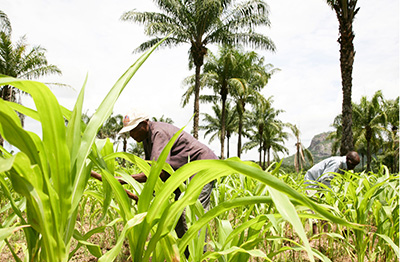
Farmers working at an agricultural experiment station (Project for the Development of Community Function Enhancement) Photo provided by Hiromi Nagakura/JICA
Evaluation of Japan's ODA to the Republic of Indonesia
Recommendations
The private sector in Indonesia is expected to play a more significant role in Japan's development cooperation in the future. Therefore, the importance of strengthening cooperation between the private sector and ODA agencies should be stipulated in Japan's Country Assistance Policy for Indonesia.
When the new ODA project can be positioned under a specific Indonesian program that has measurable targets and goals, as a new way of project monitoring, it is recommended that the progress and achievement of the project be measured with a focus on what degree the project has contributed to the Indonesian program.
The country-based ODA Task Force should be further strengthened by, for example, holding ODA Task Force meetings periodically and engaging with wider stakeholders who can contribute to the formulation of Japan's development cooperation policy for Indonesia.
A more comprehensive understanding of Indonesia's needs and expectations for Japan's ODA is essential in formulating and reviewing the development cooperation policy. Therefore, it is recommended that a comprehensive policy dialogue should be resumed between both countries.
Implementation status of response actions
Strengthening cooperation between the private sector and ODA agencies will be stated in the next revision of the Country Assistance Policy for Indonesia (scheduled for 2022 or later).
The coherence of Japan's ODA projects with Indonesia's National Development Plan is confirmed before each project is implemented. Ever since this evaluation study was first conducted, no Indonesian program with measurable targets and goals has been confirmed.
The Japanese Embassy and JICA office have maintained close communication and collaboration in relation to development cooperation in Indonesia through various opportunities, including country-based ODA Task Force meetings. Regarding an expanded ODA Task Force meeting that includes the Japan Bank for International Cooperation (JBIC) and the Japan External Trade Organization (JETRO), the timing and content of the discussions are being examined.
Comprehensive policy dialogues were originally scheduled for March 2020, but they were not held due to the coronavirus disease (COVID-19) pandemic. However, an appropriate schedule for such dialogues will be examined once the pandemic is contained.

Station building under construction and a train (Construction of the Jakarta Mass Rapid Transit Project)
Photo provided by JICA
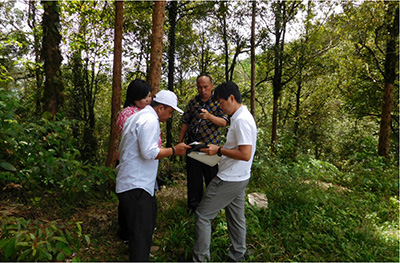
Listening to an explanation of the agricultural situation from the local government
(Public-Private-Partnership Project for the Improvement of the Agriculture Product Marketing and Distribution System)
Photo provided by JICA
Evaluation of Japan's ODA to Costa Rica and Nicaragua
Note: Field surveys were not conducted in Nicaragua due to the worsened social/political situation during the evaluation period. The evaluation of Japan's ODA to Nicaragua is based on a literature survey conducted in Japan and written interviews. Recommendations have been replaced with lessons learned based on the evaluation results, which concern both Costa Rica and Nicaragua.
Recommendations: Costa Rica
Cooperation for climate change mitigation should be continued, especially to reduce greenhouse gas emissions in the urban transportation sector which has a growing need for continuous assistance.
It is particularly worth examining the possibility of cooperation to facilitate public transportation, such as train systems, which contribute to a significant reduction of greenhouse gas emissions by using Japan's technology and experience of cooperation in other countries.
Given the urgent need for cooperation to mitigate economic disparities between urban and rural areas in Costa Rica, Japan should extend the cooperation nationwide. Japan could support systematization of diffusing "livelihood improvement approach" and also provide technical assistance for promotion of Micro, Small and Medium Enterprises in rural areas.
Implementing a study to sort out and identify critical issues in Costa Rica as a middle-income country may enable stakeholders to specify relevant themes and means of ODA. Such findings could be utilized in the formulation of development cooperation policies for other middle-income countries.
Costa Rica actively promotes triangular cooperation. As its partner, Japan should implement triangular cooperation with Costa Rica to other Latin America countries in order to strengthen the capacity of Costa Rica to implement cooperation.
Japan needs to develop better PR strategies to let a variety of people know about Japan's ODA.
For example, it is essential for Japan to share its strategies with Costa Rican stakeholders and cooperate in PR activities in order to efficiently promote Japan's ODA.
Moreover, Japan should effectively utilize social media in order to reach people of all ages.
Implementation Status of Response Actions: Costa Rica
In March 2019, JICA held a seminar in Costa Rica to share its experience on cooperation in the urban transportation sector. Currently, the Costa Rican stakeholders are considering the future development projects in this sector.
With regard to the livelihood improvement approach, Japan continues to promote human resources development through thematic training programs in order to support the Ministry of Agriculture and Stock Farming of Costa Rica promoting the approach to wider areas. In the areas where cooperation using the livelihood improvement approach has been implemented, JICA has begun to address systematization of the activities the residents have practiced.
As for promotion of Micro, Small and Medium Enterprises, Japan continues to provide support in Central America, utilizing human resources trained in Costa Rica.
Measures for responding to specific issues for middle-income countries will be considered in the next revision of the Country Assistance Policy for Costa Rica, which is scheduled for 2021 or later.
As for promotion of triangular cooperation with Costa Rica and other Latin American countries, consultations are underway with Costa Rica in the environment sector, such as geothermal development, where Japan has advanced technology.
Particularly in the environmental sector, it is expected that experience accumulated in Costa Rica would be shared with eight Central American countries through ongoing the "Project for Capacity Development on Integrated Management and Conservation of Biodiversity at regional level in SICA Region."
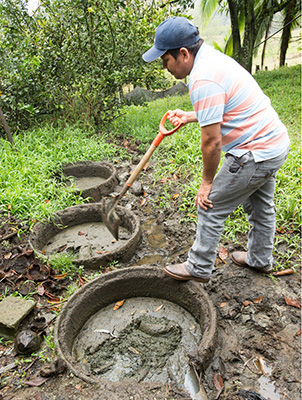
Creation of a biogas plant using receiving tanks
(Costa Rica: Project for Promoting Participatory Biodiversity Conservation)
Photo provided by Kenshiro Imamura/JICA
As for PR about Japan's ODA in a wide range of the population, MOFA has been utilizing various approaches such as sending press releases to local media and sending messages via the Embassy's website and Facebook.
Lessons Learned from Cooperation toward Costa Rica and Nicaragua
Significant and sustainable effects could be expected when implementing cooperation in prioritized sectors in the partner country's development policy where the government takes initiative.
In Latin America, collaboration with the Inter-American Development Bank (IDB) was confirmed to be more effective than bilateral cooperation because of larger fund, easier formulation and implementation of project, and less administrative costs.
It was also confirmed that combining different schemes in a program could generate synergy and greater impact.
Japan should consider the best way of approaching based on issues when implementing cooperation in multiple countries or regions.
For example, when implementing a project of a specific theme, it would be more efficient to share knowledge, lessons learned, and results obtained in one country with other countries.
On the other hand, when approaching regional common issues that cannot be addressed by a single country, it would be more effective to cooperate through a regional coordination agency as a point of contact, which has an advantage in facilitating unification of standards and procedures within the region.
It is useful to formulate policy objectives more clearly as well as to set specific indicators for each cooperation program goal in order to properly evaluate ODA results at policy level.

Mulukuku Bridge (Nicaragua: Bridge and National Road Construction Project)
Photo provided by JICA
Implementation Status of Response Actions: Costa Rica and Nicaragua
Supporting the initiatives of the partner country will be considered in the next revision of the Country Assistance Policy, scheduled for 2021 or later.
As for co-financing project with IDB, the project to promote energy-saving electrification in Nicaragua was completed in 2019. In addition, JICA and IDB continue to cooperate in implementation of a project to improve the sewage system in the metropolitan area of Costa Rica. Japan has been holding regular consultations with IDB to explore the possibility of new co-financing projects.
To promote strategic inter-scheme combination in Japan's ODA in one common program, Japan is implementing loan aid project (bridge project) in Nicaragua's transportation/traffic sector in combining with grant aid and technical cooperation projects implemented in the past. In addition, introduction of technologies and methods in the Central America is being promoted primarily in education and health care sectors through combination between technical cooperation and volunteer projects.
With regard to utilizing the expertise and lessons learned through case studies conducted in the region, the "One Village, One Product" Movement has gained popularity in El Salvador as part of efforts to address income disparities. This initiative is now being applied in Guatemala and Honduras as well.
In police sector, similar activities are implemented in Guatemala, Honduras and El Salvador with cooperation of Brazilian government based on its successful cases. Also, in the health, disaster prevention, and education sectors, projects are being formulated with a view to achieving synergy effect obtained by combining successful practices.
The framework of the Central American Integration System (SICA) is used to address regional common issues in the Central American countries. Several projects are underway in environmental protection, transportation/traffic, and climate change mitigation sectors. In addition, Japan is currently preparing for cooperation in the development of agriculture/farming areas and gender mainstreaming.
As for developing specific indicators for each cooperation program goals for Costa Rica and Nicaragua, its appropriateness will be examined as well as its advantages and disadvantages in the next revision of Country Assistance Policy, scheduled for 2021 or later.
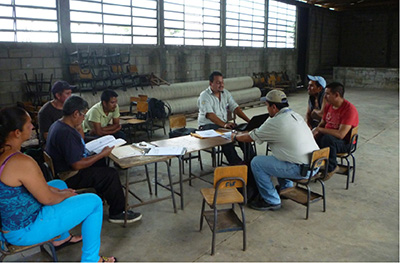
Sharing of disaster management information among residents
(Guatemala: Project on Capacity Development for Disaster Risk Management in Central America)
Photo provided by JICA

Residents holding their village's local products (El Salvador: One Village One Product Promotion Project)
Photo provided by JICA
Evaluation of Japan's Individual Grant Aid
Non-Project Grant Aid to the Republic of Togo in FY 2013
Recommendations
In the preparation document for grant aid titled "Economic and Social Development Program" (formerly the "Non-Project Grant Aid"), MOFA should include the following information: the reasons for selecting the sector and type of items to be procured, the expected outcome, and the lessons learned from previous grants.
MOFA should also improve its monitoring and recording from the delivery of procured items to their sale. Furthermore, it is recommended that MOFA should strengthen information sharing concerning the use and application of counterpart funds in advance with the partner country government. It is also recommended that MOFA should strengthen consultations and information sharing concerning Japan's assistance to countries where Japanese embassy staff are not stationed.
Implementation status of response measures
In the formulation of a grant aid project under the Economic and Social Development Program, the details of the project are scrutinized among stakeholders and its details are included in the preparation document.
In considering procurement items, efforts are made to ensure the appropriate use in the partner country. Discussions are also held to determine how the procured items should be maintained and managed after delivery, based on the partner country's management capacity and past records of the item procured in the region and the country.
Efforts are also made from the formulation stage to listen to the partner country's intentions regarding the items to be procured, whether counterpart funds will be generated, and how to use them.
During the implementation stage, follow-ups are made on various occasions, including intergovernmental meetings, and the information is shared by stakeholders.
With regard to the use, application and reporting method for counterpart funds, efforts are made to explain the details to the partner country in accordance with the situation faced by the country and the unique nature of the project on various occasions, including intergovernmental meetings. Efforts to follow up on the status in a timely manner are also made.
The Embassy of Japan in Côte d'Ivoire made an official visit to Togo and had a meeting with key government officials. The Embassy explained and exchanged views on Japan's overall policy for development cooperation in Togo. In addition, the Embassy is striving to conduct PR activities in Togo, such as the Ambassador and staff members attending the handover ceremony with President Gnassingbé and other dignitaries at the completion of a grant aid project in Togo.
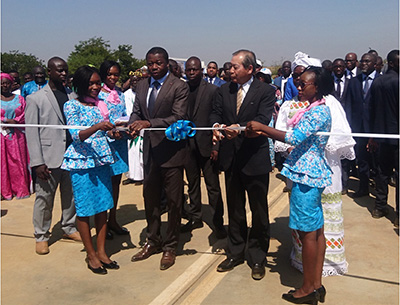
A ribbon-cutting ceremony (Togo: Delivery Ceremony for the Grant Aid Project of Construction of Two Bridges, Kara and Koumongou to Togo) (November 28, 2019)
Photo provided on the website of the Embassy of Japan in Togo
